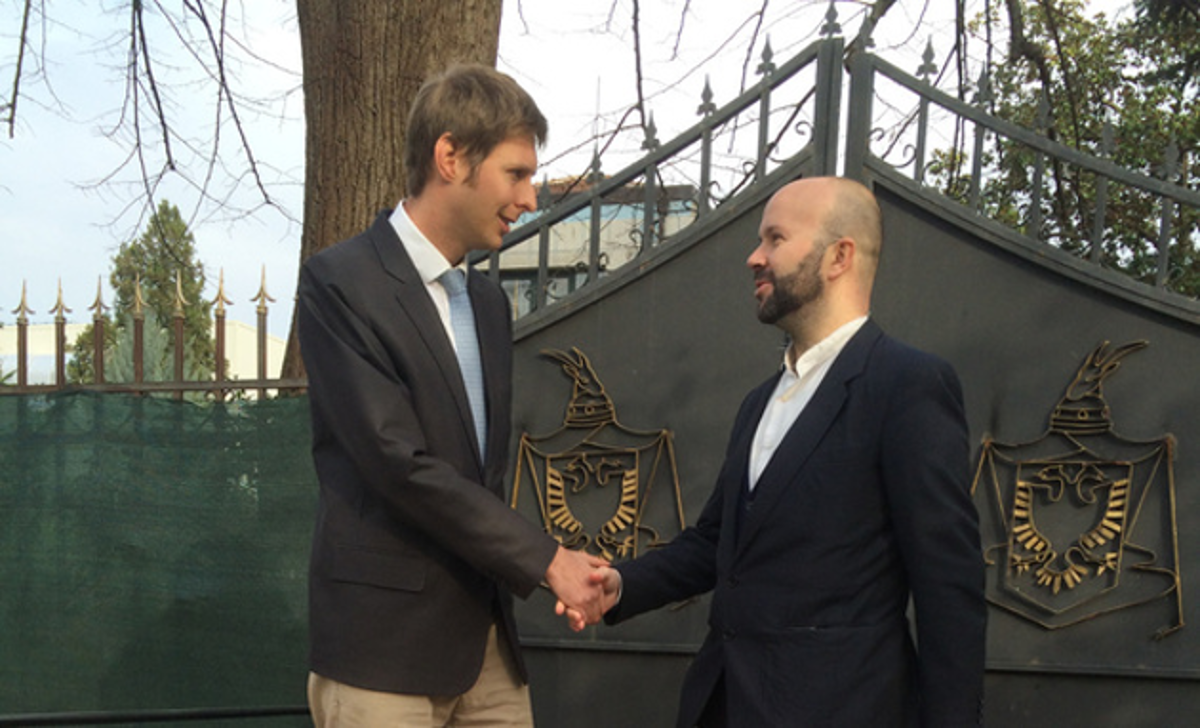Prince Leka II grandson of the incredible and legendary King Zog shall become King of All Albanians in Balkanland
By Jaime Pozuelo-Monfort, Wiley & Columbia University Press Author, Chief Strategist of Presidential Candidates, 9 Master’s Degrees, 9 Language.
Prince Leka II, educated in Britain’s most exclusive military school, has returned to Albania residing in his grandfather’s formerly owned premises in the heart of Tirana, the capital city of the tiny Balkan republic. He bears the legacy of his grandfather King Zog, a legendary character, possibly Albania’s best and most admired, in my opinion, ahead of Skanderbeg -who is fundamentally a myth- or Ismael Qemali the father of the Albanian nation founded in 1912.
Albanians suffer from an issue of false grandeur, which pretty much affects all tiny petit little nations of a similar size including in this geography Macedonia and now Kosovo. They think the country is larger than it actually is and better known in the World, where the reality is far away from this perception. They welcome the foreigner -myself- but do not listen to the foreigner’s advice. In the meantime Ambassadors patronize and -perhaps afraid therefore embracing political correctness- only say a fraction of what they should acknowledge:
- That Albania’s borders are final and any subsequent demands to alter borders in their advantage and favor are only a figment of their imagination;
- That there is no such thing as a Greater Albania, and such platonic political rhetoric is equivalent to longing nostalgically the foregone Ottoman Empire;
- That as a result any attempts to propose, claim and imagine a union with Kosovo belong in the realm of the lunatic.
And of course size does matter, it matters because countries like Albania, Kosovo or Macedonia need a larger market to operate efficiently, and this larger market is not the European Union. Albania will never win a European Football Championship, Balkanland will. Albania will never host the FIFA World Cup, Balkanland would. Balkanland is the Fiction State integrating Albania, Bosnia Herzegovina, Kosovo, Macedonia, Montenegro and Serbia.
And of course the tiny Balkan republics need at least 25 more years in a best case scenario to be ready to join the European Union, and should prioritize regional integration –tourism, infrastructure, education, market unity, regional currency– in the Balkans rather than a continental integration in the European Union that will yield a much less relevant competitive advantage.
And of course the real reason why regional integration does not happen is still animosity, hatred and rivalry of small nations, something the French and the German have long left behind, that may perpetuate in this complicated region if a radical turnaround particularly in the education of children who will soon be young adults does not take place.
And of course we then have U.S. and Russia’s interference in the domestic affairs of small nations, and the European Union “Let’s improvise” policymaking of Federica Mogherini who lacks the caliber and category of Javier Solana. The myriad of EU technocracts who come to the Balkans promising integration is unprecedented. I have never seen such a well orchestrated band of liars and pretenders. It will not happen any time soon. Turkey everybody must remember -but nobody actually does- has been a candidate for decades, much more prepared, with a per capita income which is at least double of Albania’s. Yet they end up falling in the autocracy of Erdogan, which is, regrettably, better than Albania’s crooked politics.
I sympathize with the Albanian nation. I like its people, friendly, hard-working. I think it has tremendous potential. But politics and the crooked political system have embraced a crony capitalism and according to the Economist Intelligence Unit (EIU) a hybrid regime of dictatorship and democracy. Albania claims to be a democracy, so does Madagascar, and although the countries are not comparable in per capita income terms, they belong in the same category of hybrid regime when it comes to the ranking of democratic quality undertaken yearly by the EIU.
The result of 27 years of transition to oblivion is manifest when the bystander visits this region. This country could today be closer to Slovenia than to Moldova. Its infrastructure is terrible, its educational system is Europe’s worst. This is why it needs a radical turnaround of its governance, away from politics, always in democracy. And most important it needs to embrace radical regional integration, no questions asked. The communists destroyed the individual but preserved Albania. Today’s politicians in Albania are preserving the individual, destroying Albania, its coastline with no urban planning, its cities with lack of potable water, traffic congestion and pollution, and massive inner migration from rural areas to a Tirana that can no longer absorb any more newcomers, and last but not least the individual they are trying to destroy probably unwittingly, not leading by example, ruining the educational system the communists built up impeccably.
The advantage in this context of Prince Leka II is that he is the only genuine, authentic representative of all Ethnic Albanians: those in the diaspora who have left their country behind in anger and despair with the aspiration of a better life, but also ethnic Albanians from Kosovo and ethnic Albanians living in Greece, Macedonia and Montenegro. Of all of them Prince Leka II is King, narratively speaking.
I believe a World Republic is possible. Monarchies as representative, non-executive forms of government, are an animal of the past century, to be extinguished this. In 2013 I wrote “Why Felipe Must Go” a piece published on The Huffington Post. In terms of narrative the role of the now King Felipe VI is dubious to say the least, blurry, he has inherited the throne from his father former King Juan Carlos I who played an exemplary, stellar role in the transition from the Francoist dictatorship to democracy. Juan Carlos I -in the words of Queen Sofia- would never abdicate. The transition of throne came at Monarchy’s greatest crisis of corruption, with a bad precedent of how Alfonso XIII left Spain in 1931, at night escaping to neighboring France, leaving room for the instauration of the Second Republic, overtaken through coup d’etat by Franco’s civil war win. Felipe VI should ask Spaniards in a referendum an option they were never given: whether they want him to rule as King.
Prince Leka II’s ascent to King is of a different nature, since this role does not imply Albania will become a parliamentary Monarchy. Prince Leka II will not be King of Albania but King of Albanians. Today Albania’s President or Prime Minister only represent Albanians living in Albania, and do so as long as they remain in the post for a maximum of 8 years. Prince Leka II, as King, will however represent all Albanians worldwide during a lifetime, not limited to 8 years. I like this representation. If I was Albanian I’d like someone like Prince Leka II to be my representative, figuratively speaking, albeit not my only representative.
When I met Prince Leka II for two hours at the Albanian Royal Court in Tirana city center, I felt the presence of his grandfather King Zog. I like Prince Leka II because he is modest and chooses to play a low profile. He is accessible and straightforward. On the other hand I never met Queen Sofia in spite of my dozens of requests via snail mail and email, a Queen Sofia who is well known for supporting noble causes, unless the nobel cause is embraced by a fellow Spaniard “nadie es profeta en su tierra” we say in the land of envy and jealousy (Spain).
In the narrative I design for the region, namely Balkanland, there is a stellar role to play for Prince Leka II, future King of All Albanians. I admire the tranquile and docile Prince whose sole purpose in life, he may think, is to maitain the legacy of his grandfather. There might be a legacy of your own to develop hereafter, Prince Leka II, it will take off in a different form though.
To find out more about King Zog’s figure and legacy the reading of Professor Bernd J. Fischer‘s “King Zog and the Struggle for Stability in Albania” is essential and highly recommmended.
— Published on September 4, 2018





















